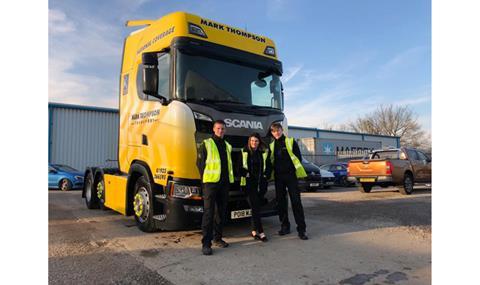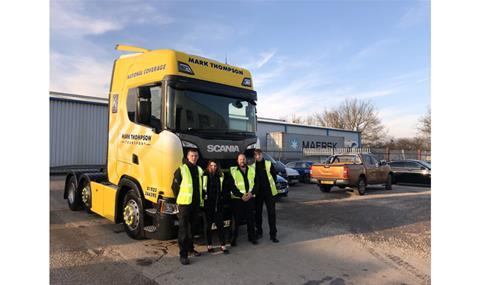
The transport and logistics industry has paid an estimated £130m in Apprentice Levy taxation since its introduction in April 2017 but has reclaimed only a fraction of this sum to fund training new or existing staff.
With Brexit expected to lead to a further exodus of EU drivers and warehouse staff, the Levy was supposed to help industry plug the gap by recruiting and training more UK workers.
According to the FTA, including HGV and van drivers, fork lift operators and warehouse personnel, EU workers represent more than 12% of the UK’s logistics workforce.
The levy is payable by employers with an annual wage bill over £3m and they must pay 0.5 % of their payroll into a government account. They then have a rolling 24 months to reclaim the funds to meet the cost of approved apprenticeship training – if they fail to meet the deadline the money goes to the Treasury.
Only apprenticeships which last 12 months can be funded and the logistics sector has just three approved Trailblazer apprenticeships: Logistics and Supply Chain LGV Driver Level 2; Logistics and Supply Chain Operator Level 2; and Logistics and Supply Chain Warehouse Operative Level 2.
Success
Despite the tide of criticism of the levy, Mark Thompson Transport (MTT) in Warrington is successfully using levy funding and has claimed back all the firm’s contribution and has recently employed three apprentices, Jack Tinsley, Daniel Robb and Caitlin Roberts on Logistics and Supply Chain Operator apprenticeships.
James Scott, operations director of MTT, launched the apprentice initiative in June 2018, and had initially tasked HR adviser Rachel Threlkeld and transport manager Paul Prior (in conjunction with Mantra Learning business improvement consultant Paul Manfredi) with finding one apprentice for the company.
It was three months down the line when the pair reported back to Scott with three outstanding candidates for the position. Scott made the decision to take on all three, and the programme has never looked back.
“There has been quite a negative response to the Levy, and a lot of people just see it as a tax,” Prior says. “Most companies try to use it to train drivers but we identified a need for more office staff especially traffic operators. We wanted to recruit one apprentice to spend a year in the traffic office, a year doing their international CPC and then a year getting their HGV licence so they would be the full package.”
The recruitment process threw up three candidates with different skills sets so all three were offered apprenticeships.
Roles
“These three have carved out roles for themselves already,” Prior says. “They are not here just to make the tea – they are coming up with ideas and have had a massive impact on this business.
“Caitlin has come up with a system for filing driver daily walkaround checks, Jack is looking at the IT we use for managing drivers’ hours and Dan understands the transport planning side of it. But we switch them around so they get to spend time in every part of the business.”
MTT is based in Warrington and runs 209 trucks hauling a wide range of goods for customers across the North West of England. It employs around 160 drivers and relies on a pool of 60 regular agency to fill shifts, especially in the Christmas peak.
Part of Kinaxia Group since July 2017, the haulier is growing fast and needs skilled people to cope with its ambitious expansion plans.
“There is a driver shortage but it’s not as big as people say because a lot of poor quality hauliers have gone out of business,” says Prior. “Where we were short was staff to manage the drivers. We have 18 operating centres across the whole country so the management workload is horrendous.”
After completing the traffic office operator Level 2 scheme in year one, the plan is to move them on to Level 3 in year two.
MTT is working with Manchester-based training provider Mantra Learning, and Manfredi says that, while this Level 3 scheme has not yet been written and approved, he is confident it will be ready in 2019. In year three, the three will move onto LGV Driver apprenticeship.
“Currently this only includes one licence, category C, so hopefully by then it will include both category C and C+E licences,” Manfredi says. “Mark Thompson is looking for the full package, someone who can do and understands everything. They might not be a full time HGV driver but they need to understand it to be a transport manager.”
Everyone in the MTT traffic office has an HGV licence so if a vehicle needs to be moved or taken for a service anyone can jump in the cab and do it.
Maybe one reason road transport has failed to claw back its Apprenticeship Levy is the difficulties in attracting enough young people to want to work in the industry. It is not high on most school leavers’ radar when it comes to choosing a career and it is no surprise to hear that two of MTT’s recent intake already had connections with the industry.
16-year-old Jack Tinsley says he has “always been into trucks” and his mother already works for MTT. “My mum works in finance here and my dad works in Merseyside Police’s regional commercial vehicle unit,” he says. “I want to get my CPC and understand how the business runs so I can make a difference.”
Caitlin Roberts, also 16, has transport connections too. “My mum works at a different transport firm so I have been around it all my life,” she says. “I am more interested in compliance and making sure we run legally. I also want my CPC and HGV licence so I can relate to the drivers.”
Behind the wheel
Tinsley and Roberts will only be 18 when MTT plans to put them behind the wheel, first in vans and smaller rigid trucks, but Prior says there will be no problems with insurance. “Some insurers won’t touch anyone under 25,” he says. “We are insured with the NFU and they have no stipulation on age. Insurance companies have realised that if they don’t allow younger drivers they are going to fail because we need drivers on the road.”

Daniel Robb is 19 and has come to MTT after working as a van driver’s mate and at an aftermarket car parts retailer. “I wanted to be in the office so it was a big step to get this apprenticeship,” he says.
Apprenticeships used to be highly respected routes into a skilled trade, but have been devalued in the eyes of many school leavers in recent years as less valuable alternatives to degrees. But Tinsley is happy to be combining studying with practical training in a workplace.
“It is more hands-on than just being at college all the time,” he says. “We don’t get told what to do and we learn in gradual steps. I was quite excited to get out of school and into a work environment.”
Roberts too was actively seeking an apprenticeship when she left school. “I was definitely looking for an apprenticeship,” she says. “I am not academic at all and I am better in a working environment. I wasn’t 100% sure what I wanted to do but when this opportunity came up I had an idea what was involved.”
Robb had already completed a Level 3 apprenticeship in Motorsport Engineering with his previous employer but says he didn’t want to end up in an office job. “It was just talking about it instead of actually doing it,” he says. “It wasn’t for me.”
Good response
MTT HR adviser Rachel Threlkeld says the company had a very good response to its recruitment campaign.
“We already knew of Mantra so we approached them to help develop the advert that went online,” she says. “We got a lot of interest and we had so many applicants it was difficult to pick.”
Manfredi adds: “Mark Thompson offered a good package including minimum wage of £4.50 rising to £5 through the apprenticeship and a long-term career progression. We got candidates of all ages and backgrounds and it was a difficult process.
“We were looking for people who could think on their feet, be problem-solvers, get up early and work in a team. I’ve learned that you can’t advertise a traffic planner job because no one knows what it is. So you have to advertise a skills set you are looking for and find out at the interview if the person in front of you has that skill set.
“Mark Thompson was looking for one person and took three because each one had a different strength and we couldn’t decide which was the most important so we took all three.”
Prior was particularly keen to take on a female apprentice as he wants to promote transport as a good career for women. “It has a calming effect on the drivers,” he says. “They won’t rant and rave as much at a female!”
Catching them young
Mantra is a supporter of Think Logistics, the initiative to get school children interested in a career in the logistics sector founded by Abbey Logistics chief executive Steve Granite, but MTT did not find its latest intake of apprentices through Think Logistics.
“We used various internet job sites,” says Threlkeld. “There are very few careers advisers in schools these days.”
Kinaxia is however keen to start working with schools and colleges in future, according to Prior.
In July 2016, Mantra launched the National Logistics Academy to provide training and apprenticeships to levy-paying national logistics employers through a network of specialist logistics training providers.
“I’d like to see Mantra, the National Logistics Academy and Think Logistics addressing 11-year-olds and getting them interested in road transport,” says Manfredi. “I’d like to see trucks turn up in school car parks at open days with simulators on the back to get kids enthusiastic so they choose to come into the industry rather than just fall into it.
“We need to show that they can come in with poor GCSEs and within 20 years be a director or be running their own company. Mark Thompson himself started out at 19 with one van and now has 200 trucks on the road.”
The future is bright
While Brexit remains top of the news agenda, the full impact will not be known for many years, so what do teenagers just starting out on their careers make of the UK’s exit from the EU?
“It doesn’t worry me because what we do here is national not international transport,” says Tinsley. “If we leave the EU, stuff still needs moving around.”
“To be honest it is just something that is always on the telly when you having breakfast,” adds Robb.
While none of the three apprentices have been brought in as full-time drivers, do they foresee driverless trucks on our roads in their lifetime?
“No,” says Robb. “You will always need someone to make decisions that only a human can make.”
Roberts agrees. “There may be automatic trucks but not driverless,” she insists.
But they can certainly imagine a world without physical shops as the rise of online shopping makes bricks and mortar redundant. “I can’t remember the last time I went into a shop and bought something,” says Roberts.
This is leading to a new internet boom – returns – and Mantra has just built a 17,500sq ft training facility purely for teaching people how to manage returned products. “Goods out is diminishing because of automation but returns, with all the quality assurance and checking required, is growing. That is part of the future of transport,” says Manfredi.











